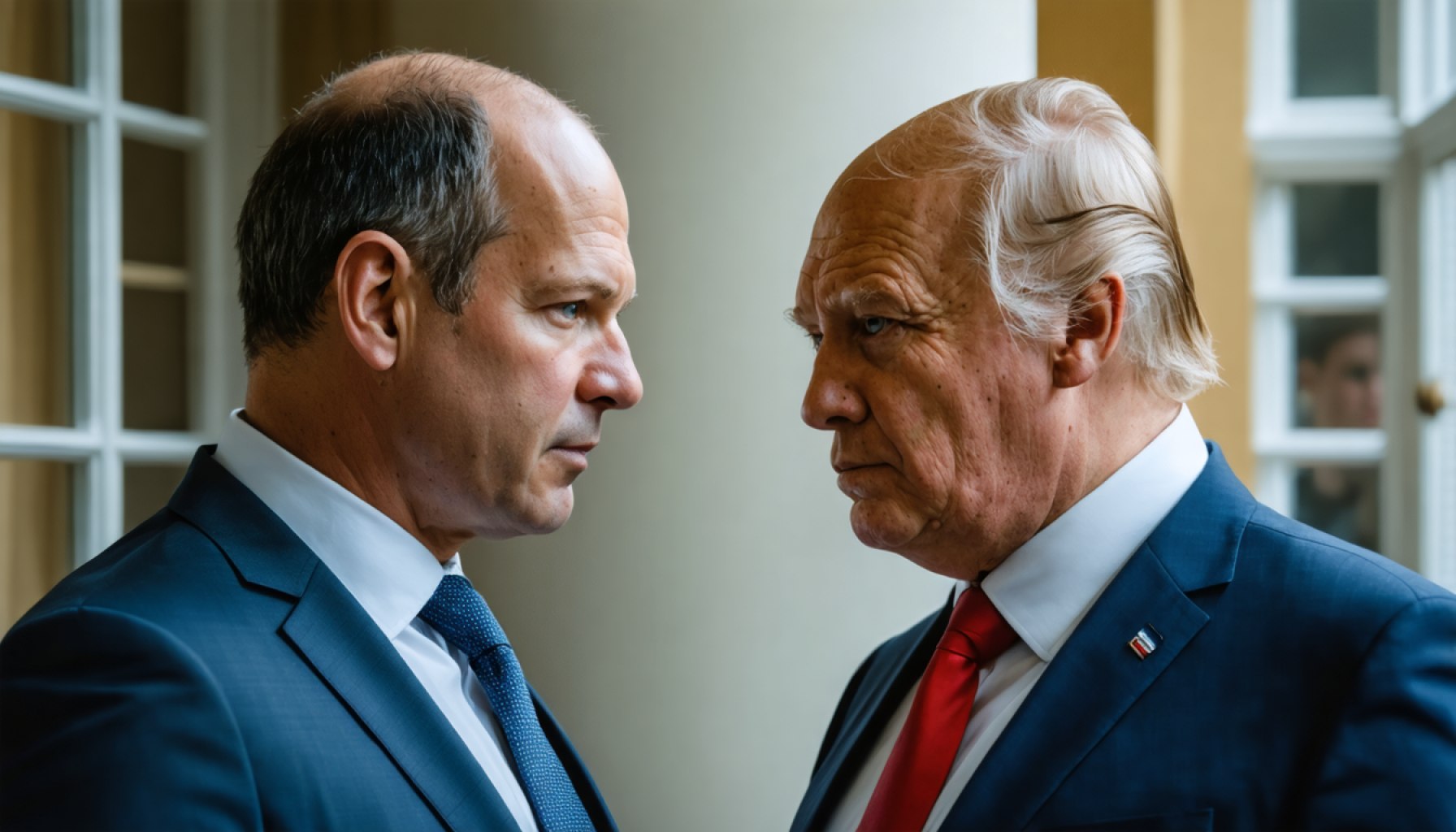- Friedrich Merz and Olaf Scholz are the central figures in Germany’s current political contest, showcasing a transformation in their styles—Merz’s energy tempered and Scholz’s assertiveness unveiled.
- A documentary by Mathis Feldhoff and Andreas Huppert explores their evolving strategies and compelling narratives during the election campaign.
- Merz, once a sidelined CDU figure, returns with renewed determination, having been shaped by his past business endeavors.
- Chancellor Scholz counters criticism of his coalition leadership with unexpected boldness in public opinion battles.
- The evolving competition raises questions about leadership, resilience, and the political future of Germany, reflecting on their distinct paths and the shaping of history.
In the crisp mornings of Germany’s political arena, two heavyweight contenders emerge in a contest that promises to stir the nation. On one side stands Friedrich Merz, whose once fiery disposition now simmers with a statesman’s calm. Contrasted is Olaf Scholz, the current Chancellor, gradually shedding his usual restraint to reveal a surprisingly assertive demeanor.
This duel, captured with precision by Mathis Feldhoff and Andreas Huppert, unveils a narrative as compelling as any thriller. Their documentary, “Kanzler und Herausforderer – Scholz und Merz im Wahlkampf,” paints vivid portraits of these political rivals, tracing their evolving strategies through campaign trails and public debate stages.
Merz, once ousted by Angela Merkel, now resurfaces with a tenacity sharpened by his years in the business world. His journey from a sidelined CDU figure to its leader echoes with determination—a tale of comeback steeped in resilience. Meanwhile, Scholz, often criticized for his tenure leading the coalition government, navigates the turbulent waters of public opinion with newfound vigor.
As they vie for Germany’s future, questions linger in the air like fog over Berlin’s iconic skyline. Can Merz, with his unyielding drive, maintain his lead in the polls? Or will Scholz, underestimated yet unflinching, bridge the gap by revealing facets unknown to the electorate?
These political titans, with careers marked by their distinct paths and challenges, embody the essence of modern German politics. Their campaign is more than just a race—it’s a reflection on leadership, endurance, and the paths that shape history.
The Political Showdown: What to Expect from the Merz vs. Scholz Battle
Real-World Use Cases and Insights into German Politics
The political contest between Friedrich Merz and Olaf Scholz offers a lens into several critical aspects of German politics and governance. Their race is not just about who will take the chancellery but also highlights the evolving dynamics of Germany’s political parties and policies. Here are some crucial areas to consider:
1. Leadership Styles and Public Perception
– Friedrich Merz: Known for his business acumen as a former chairman of BlackRock Germany, Merz’s leadership style is characterized by decisiveness and a focus on economic growth. He represents a traditional yet reformist stance within the Christian Democratic Union (CDU). His return to politics marks a shift towards center-right policies, prioritizing fiscal discipline and business-friendly reforms.
– Olaf Scholz: As the current Chancellor, Scholz leads the Social Democratic Party (SPD) with a pragmatic approach focused on social justice and climate policies. Scholz’s unexpected assertiveness in office reflects a strategic pivot to address Germany’s pressing challenges, such as energy transition and labor market changes.
2. Market Forecasts & Industry Trends
– Economically, the result of this political contest could influence critical sectors like renewable energy, automotive, and tech. Both leaders must address Germany’s role in the European Union, its economic leadership, and innovation in sustainability and digitalization.
3. Features, Specs & Pricing: Political Proposals
– CDU’s platform (Merz) generally emphasizes tax cuts, reduced bureaucracy, and strengthening ties with the U.S. for trade.
– SPD’s agenda (Scholz) includes enhancing social welfare, tackling climate crisis with bold policies, and advocating for stronger EU collaboration.
4. Reviews & Comparisons: Voter Opinions
– Merz: Strong support comes from traditional conservatives and business communities.
– Scholz: Appealing to younger voters and urban demographics through green policies and social reforms.
5. Controversies & Limitations
– Merz: Criticized for his ties to financial industry elites, raising concerns about corporate influence in politics.
– Scholz: Faces skepticism over coalition governance inefficiencies and bureaucracy delays.
6. Security & Sustainability
– Both candidates must address Germany’s energy dependency amidst global uncertainties. Scholz focuses on renewables, while Merz emphasizes nuclear power’s potential role.
7. Pros & Cons Overview
– Merz Pros: Economic expertise, strong business ties, decisive leadership.
– Merz Cons: Seen as too pro-business, potential alienation of non-conservative voters.
– Scholz Pros: Experienced in governance, broad coalition builder, social policy-oriented.
– Scholz Cons: Perceived slow decision-making, coalition compromises.
Actionable Recommendations and Quick Tips for Voters
– Stay Informed: Follow both candidates’ campaigns closely for emerging policies and their potential impact on daily life.
– Engage in Local Dialogues: Community forums and debates can provide a more nuanced understanding of each candidate’s proposal’s implications.
– Fact-check Information: Use trusted news outlets and independent fact-checkers to validate claims and promises.
– Engage with Policy Experts: Platforms like the Brookings Institution and the Chatham House provide analysis on global political trends and their implications.
This political duel is not just a leadership choice but a decision shaping Germany’s future trajectory. Active civic engagement and informed voting remain the cornerstones of impactful political participation.
